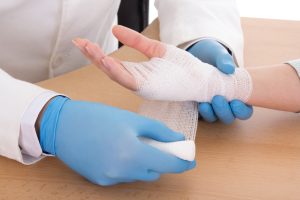
Reehana Shah, USA
With more than 56 million cases worldwide and more than 1.3 million deaths, Covid-19 has held the world in a vise-like grip for almost a year now. [1] However, this past week brought some much-needed good news in what has so far been an unrelenting, pandemic stricken year. Pfizer and BioNTech revealed that their experimental Covid-19 vaccine had a 95% success rate [2], while Moderna also announced the successful results of its Covid-19 vaccine. [3] Vaccines have been one of the most important innovations of modern medicine. The prevention of disease and the protection against outbreaks has, without a doubt, changed the course of healthcare around the world. As the race to develop this new vaccine moves closer to the finish line, it’s worth taking a look at the history and origins of vaccines and understanding the fundamental role that Muslim scientists have played in developing this technique.
In Western historical accounts, some of the earliest mentions of inoculation can be found during another pandemic, smallpox. While the disease ravaged England, and was being carried across oceans to devastate Native American populations in newly established colonies, inoculation was routine practice in Northern Africa, throughout the Ottoman Empire, and parts of the Middle East. [4] In the Islamic world, the practice was common; in England it was terrifying. The idea that a seemingly ritualistic practice among uneducated tribes could be effective in fighting a disease led to loud objections against its use. [5] Underlying this fear was the arrogance that a technique used by ‘ignorant people in ignorant societies’ could work among the civilized English. [6]
Its use in England was championed by a woman, Lady Montagu, the wife of the English ambassador in Istanbul between 1716 and 1718. She became fascinated by the procedure after having her son successfully inoculated by the embassy surgeon, Charles Maitland. [7] Lady Montagu wrote about the procedure in great detail in her letters and upon her return to England, championed inoculation as a means to protect against smallpox. Though she encountered great opposition from the Church and many physicians, she succeeded in having the procedure adopted as standard practice. [8] Dr. Emmanuel Timonius, who had been the Montagu family’s physician in Istanbul, further supported the practice when he submitted a scientific description of inoculation to the Royal Society in 1724. This was supported by Cassem Aga, the ambassador of Tripoli, who gave a firsthand account of its use and safety throughout Tripoli, Tunis, Algiers and much of the Muslim world. [9]
In his letter to the Royal Society, Dr. Timonius wrote:
‘…the Circassians, Georgians, and other Asiatics, have introduced this practice of procuring the smallpox by a sort of inoculation, for about the space of forty years, among the Turks and others at Constantinople.
…since the operation, having been performed on persons of all ages, sexes, and different temperaments…none have been found to die of the smallpox. They that have this inoculation practiced upon them are subject to very slight symptoms, some being scarce sensible they are ill or sick; and what is valued by the fair, it never leaves and scars or pits in the face.’ [10]
Interestingly, this letter prompted a reply from a minister in Boston, Massachusetts. Upon reading the letter by Dr. Timonius, Cotton Mather wrote to the Royal Society:
‘…many months before I met with any intimations of treating the smallpox with the method of inoculation, anywhere in Europe; I had from a servant of my own an account of its being practised in Africa. Enquiring of my Negro man, Onesimus, who is a pretty intelligent fellow, whether he had ever had the smallpox, he answered, both yes and no; and then told me that he had undergone an operation, which had given him something of the smallpox and would forever preserve him from it; adding that it was often used among the Guramantese…and his description of it made it the same that afterwards I found related unto you by your Timonius.’ [11]
Onesimus was originally from what is now Guinea (West Africa), and Mather had this conversation with him many months before the publication of Dr. Timonius’s letter. Lending further proof to Mather’s letter, another minister by the name of Benjamin Colman also reported similar conversations with enslaved men who had also been inoculated. [12] Since Islam had spread to the African continent during the lifetime of the Prophet Muhammad (sa), [13] it is entirely possible then that these men, before they were forced onto slave ships destined for the colonies, had been Muslims and were therefore familiar with the practice of inoculation.
Though a staunch Christian, Mather also argued that Muslim science and medicine was far superior to that which was practiced in Europe and in particular, advocated for the use of inoculation to protect against smallpox. [14] A strange paradox existed in most European and Anglo-American institutions; they considered Islam to be inferior, but held great respect for Islamic scientific and medical achievements. Although he met fierce opposition, Mather ultimately convinced the leaders and citizens of Boston to utilize inoculation to protect the city from an outbreak of smallpox.
Without Mather’s faith in Islamic medicine, Boston would have been devasted by smallpox. Without Lady Montagu’s determination to normalize what she saw and experienced in Istanbul, England would also have continued to suffer. Eventually, Edward Jenner pioneered a much safer version of inoculation which went on to become the standard of modern-day public health. It is worth noting however, that none of this would have been possible without the work of Muslims from the Middle Ages until the eighteenth century. Not only did Muslims determine that smallpox and measles were two different diseases, a discovery made by the Iranian physician Muhammad ibn Zakariya al-Razi, but they also refined the process of combating it through inoculation in various parts of the Muslim world. [15] The case of the Ottoman Empire is significant because it shows that post medieval Muslim scientists were still flexible enough to deploy new techniques to combat serious public health issues. [16]

Iranian physician Muhammad ibn Zakariyah ar-Razi ©Shutterstock
Many of the advancements made in modern medicine would simply not have been possible without the early contributions of Muslims. Even during the seventeenth and eighteenth centuries there was enormous Western interest in Arabic science. This thirst for knowledge was so strong that several prominent English scientists, such as chemist Robert Boyle and astronomer Edmond Halley, a contemporary of Sir Isaac Newton, learned Arabic in order to better understand key texts in their respective fields. [17] The discovery and documentation of Halley’s comet, named after Edmond Halley, would not have been possible without the groundwork laid out by early Muslim astronomers. John Locke, the famous English political philosopher, could read Arabic and owned a copy of the Holy Quran while Cotton Mather himself also knew enough of Arabic and the Holy Qur’an that he could cite English translations in his sermons. [18]
When it comes to medical discoveries and innovations, the Islamic origins are too often ignored, while credit is given solely to Western institutions and academics. The reality is that much of what we know about medicine, astronomy, physics, and many other fields of academia have their roots in the work of Muslim scholars. The new Covid-19 vaccines will be the latest innovation in a centuries old practice and leading this groundbreaking research are once again, Muslims. Dr. Ugur Sahin and Dr. Ozlem Tureci are a Turkish husband and wife team in Germany and co-founders of BioNTech, a small biotech firm that partnered with Pfizer to create the Covid-19 vaccine; a vaccine which could potentially be distributed globally in early 2021, bringing hope and relief to millions. [19, 20]
The acquisition of knowledge is nothing new to Islam. The teachings of Islam require a Muslim to continually strive for the progress of humanity and the Holy Qur’an has laid great emphasis on this pursuit and instructs believers to explore, investigate, and utilise their intellect and God-given faculties. [21, 22] Those who strive to advance human knowledge for the benefit of humanity will reap the rewards of Allah for their efforts. [23] Whether in the past, in present day, or in the near future, Muslim scientists and inventors have played a fundamental role in preserving knowledge and developing technologies that continue to transform our world.
About the Author: Reehana Shah is a Canadian-American currently living in the United States. She holds a BA Honours in International Studies, Cooperation and Conflict, and Russian Studies and is a part of the Review of Religions online team.
ENDNOTES
- Johns Hopkins University (November 18, 2020). Covid-19 Dashboard by the Center for Systems Science and Engineering (CSSE) at Johns Hopkins University. https://coronavirus.jhu.edu/map.html
- Irfan, Umair (2020, November 18). Pfizer’s Covid-19 vaccine just came a little closer to emergency approval. Vox. https://www.vox.com/2020/11/18/21571475/pfizer-covid-19-vaccine-fda-biontech-update-moderna-emergency-use
- Irfan, Umair (2020, November 16). What Moderna’s Covid-19 vaccine results mean for ending the pandemic. Vox. https://www.vox.com/21569425/moderna-vaccine-effective-side-effects-temperature-covid-19
- Shetty, Priya (2011, July 2). Arabic Roots of Modern Medicine. The Lancet,378(9785), https://www.thelancet.com/journals/lancet/article/PIIS0140-6736(11)61004-0/fulltext
- Ibid.
- Ibid.
- “Inoculation from East to West”, 1001 Inventions, https://www.1001inventions.com/feature/inoculation/
- Ibid.
- Ibid.
- Boylston, Arthur (2012, July), The origins of inoculation. Journal of the Royal Society of Medicine, 105(7), https://journals.sagepub.com/doi/10.1258/jrsm.2012.12k044
- Ibid.
- Ibid.
- Ahmad, Hazrat Mirza Bashirudeen Mahmud. Life of Muhammad. Islam International Publications Ltd., 1990. https://www.alislam.org/library/books/Life-of-Muhammad.pdf
- Boylston, Arthur (2012, July), The origins of inoculation. Journal of the Royal Society of Medicine, 105(7), https://journals.sagepub.com/doi/10.1258/jrsm.2012.12k044
- Foley, Sean (2014, April). When an American Minister Put His Faith in the Power of Islam: Muslim Medicine, Reason, and Public Health in the Modern World. International Journal of History, 6(3), https://www.seanfoley.org/wp-content/uploads/2012/03/484372167_7-sean_foley.pdf
- Ibid.
- Shetty, Priya (2011, July 2). Arabic Roots of Modern Medicine. The Lancet,378(9785), https://www.thelancet.com/journals/lancet/article/PIIS0140-6736(11)61004-0/fulltext
- Foley, Sean (2014, April). When an American Minister Put His Faith in the Power of Islam: Muslim Medicine, Reason, and Public Health in the Modern World. International Journal of History, 6(3), https://www.seanfoley.org/wp-content/uploads/2012/03/484372167_7-sean_foley.pdf
- Scientist couple behind Pfizer’s Covid-19 vaccine is Muslim (2020, November13). https://theislamicinformation.com/scientist-couple-pfizer-covid-19-vaccine-muslim/
- Pancevski, B., Hopkins, J. S. (2020, October 22). How Pfizer Partner BioNTech Became a Leader in Coronavirus Vaccine Race. The Wall Street Journal. https://www.wsj.com/articles/how-pfizer-partner-biontech-became-a-leader-in-coronavirus-vaccine-race-11603359015
- Ahmad, Mirza Masroor (2019, October 9). Islamic Principles on Education and Serving Humanity – Keynote address at UNESCO headquarters. https://www.alislam.org/articles/islamic-principles-on-education-serving-humanity/
- Ahmad, Mirza Masroor (2019, December 14). Ahmadi Muslim Researchers – Restoring Islam’s Golden Age. https://www.alislam.org/articles/ahmadi-muslim-researchers-restoring-islams-golden-age/
- Ibid.




Alhamdulillahi…!
Every achievement is to the Glory of Allah Taala, The Omniscience of all beings.